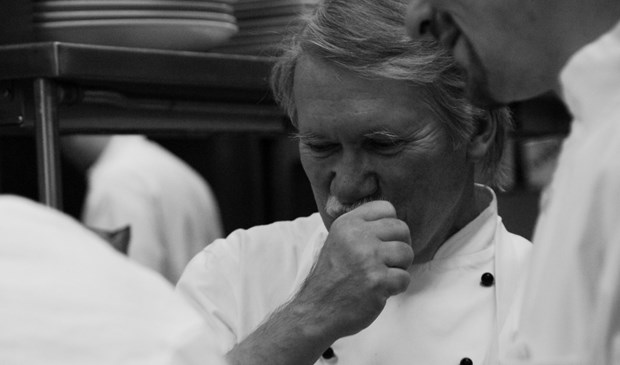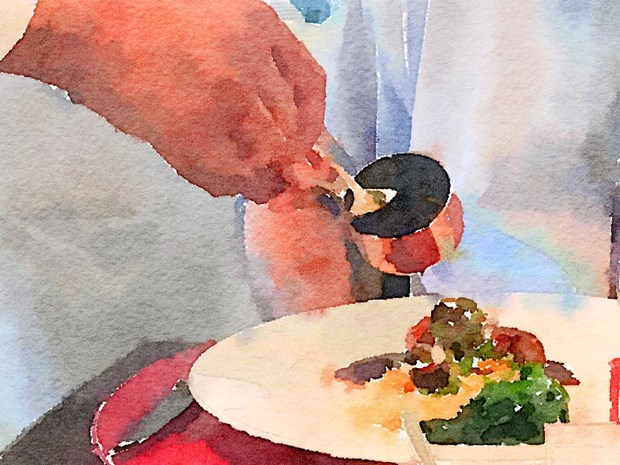Kitchen teams are intense and tight knit – bonds are forged under high heat and high pressure.

Chef Paul Sorgule. Photo of Harvest America Ventures
As a new cook, whether entering a kitchen for the first time, or
joining a new team, it can be difficult, at first, to break into the club. The
rest of the team need to know that you can be relied upon and won't sink them,
and that you can get on board with their unique kitchen culture.
How
best to achieve acceptance in a new kitchen is the subject of a another
fantastic blog post penned by chef Paul Sorgule over at Harvest America
Ventures, informed by his decades of experience in professional kitchens. He
has some sound advice for new cooks: essentially, get your head down and take
it slowly, treat everyone with respect and don't annoy anyone.
1. Levels of trust
We
would all like to believe that there is unconditional trust among team members,
but this is quite rare. In all likelihood a new cook will enter a kitchen right
in the middle of mistrust and unconditional trust. In other words, every other
team member is guarded with his or her feelings of trust – they will watch the
new cook for any signs of violating the pact of the kitchen. It only takes one
misstep for the team to write off the new cook as untrustworthy.
2. Skill anxiety
Even
the most seasoned cook is cautious about a new team member: “Are my skills as
good or better than the new cook’s?” “Will the new cook be able to work
consistently at the same level as our team?” This anxiety of competence will be
prevalent equally among existing and new members of the team. The new cook
should do what he or she does consistently well, admit when his or her skills
are lacking with a particular task, ask for help, offer help when others may
ask, and by all means never try to correct an existing team member’s skills
until the transition time is over.
3. Don’t rearrange my
routine
Every
cook learns a definitive way of approaching his or her job; they apply certain
steps and procedures that are unique to them, but that after trial and error
work (for them). It is always important to note that a cook’s routine impacts,
at some level, everyone else’s routine. So… a new cook who intends to interject
his or her routine into an already established kitchen flow will incur
resistance. Sometimes it is best, at least in the beginning, to listen and
adapt to how things are currently done. This accommodation until trust is built
among team members will serve a new cook well.
4. Systems may be
different
It
would be a mistake to state that there is a right or wrong system for the
operation of a kitchen, and in particular – a line. There are dozens of ways
that chefs and cooks adapt established methods to work in a specific operation.
Equipment, kitchen layout, staff expertise, and menu will always drive the
system that evolves over time. The system that a new cook may be use to might
not work in his or her new kitchen home. Be open minded and willing to listen
to the how and why things are done a certain way in your new environment. Your
thoughts might be better, but remember it is ultimately important to win that
trust from the team first.

Photo of Harvest America Ventures
5. Respect above all
else
First
and foremost, every kitchen team is looking for respect. They are where they
are as a result of trial and error, refinement, investment in skill
development, communication, definition of flavour profiles, and trust among all
of the players. A new cook who respects this will go a long way towards
acceptance and the end goal of “fitting in.”
6. Hang on to those
great ideas
There
is a great deal of truth to the statement that “a new set of eyes can help a
business improve.” Your ideas are important to you and may become a catalyst
for positive change in a kitchen. It’s all about timing. Once that team trust
is gained and you have been accepted as a member of the kitchen unit then your
ideas will likely find a receptive audience. Standing on a soapbox too early
will kill the best ideas.
7. Crawl, walk, and
then run
Patience
is a virtue whether you are brand new to kitchen life or a seasoned veteran
moving to a new restaurant. If your hope is to become a leader, then realise
that the most important attribute of a leader is that he or she needs
followers. Look behind you, take your time, listen, support others, demonstrate
your dependability, and you will begin to find more team members listening to
you and choosing to follow your example. Leaders are born from trust and
consistency.
8. Have other team
members’ backs
The
brother and sisterhood of the kitchen are born from the realisation that
everyone is in it together. If there is a weak link then others will step up to
help, if someone is off a step or in the weeds then others will pick up the
slack, if mistakes are made then the team takes responsibility and chooses not
to point fingers. When this environment is present then the kitchen will thrive
and win, when it is absent then failure will raise its ugly head. This is
always true! As a new cook you need to learn this “code of the kitchen” – we
are in this together – all for one and one for all.
9. You’re either
dependable or not
Ask
a chef what trait is deemed most important in a kitchen and after careful
thought I am confident that he or she will point to dependability. I am not
referring to occasional dependability, but rather dependability as part of a
person’s character. Cooks – new or seasoned – must be 100% dependable. Will you
show up to work on time, take care of your station, always prepare enough mise
en place for whatever comes your way, consistently address each dish the way it
was meant to be prepared, insist on impeccable sanitation, cut those vegetables
just right, take the time to follow cooking procedures to the letter of the
law, show up to work fully focused on the job, approach the job with
professionalism, refrain from putting others down, and remain totally committed
to customer service – ALWAYS? That is what is meant by dependability.

Photo of Harvest America Ventures
10. Be honest, just
not brutally honest
If
the kitchen is to succeed as a cohesive unit then honesty must be the baseline.
Tasting other’s food – be honest, critiquing a plate presentation – be honest,
reflecting on how service went – be honest, and commenting on how others run
their station – be honest. The caveat is that there is a difference between
honesty and brutal honesty – it is the same as the difference between critique
and criticism. Critique is honesty with assistance – showing the individual how
to make things better without being demeaning. Criticism is the opposite and
almost always leads to misinterpretation, embarrassment, and anger. Choose your
words wisely.
11. Once accepted,
the opportunities to contribute will increase exponentially
In
the end, if you take the time to observe, mentally catalogue, listen, reflect,
and focus on becoming a member of the kitchen team first then there will be
countless opportunities to contribute and offer your unique talents to the
ongoing success of the kitchen. Learn to fit in first.
By FLD